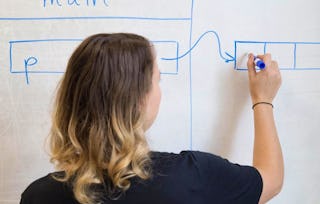Le troisième cours de la spécialisation Introduction à la programmation en C présente les constructions de programmation que sont les pointeurs, les tableaux et la récursion. Les pointeurs offrent contrôle et flexibilité lors de la programmation en C en vous donnant un moyen de faire référence à l'emplacement d'autres données. Les tableaux permettent de regrouper des données en garantissant que les séquences de données sont regroupées. Enfin, les fonctions récursives (fonctions qui s'appellent elles-mêmes) constituent une alternative à l'itération très utile pour la mise en œuvre de certains algorithmes.

Pointeurs, tableaux et récursivité

Pointeurs, tableaux et récursivité
Ce cours fait partie de Spécialisation Introduction à la programmation en C



Instructeurs : Andrew D. Hilton
45 790 déjà inscrits
Inclus avec
349 reviews
Compétences que vous acquerrez
- Catégorie : Pensée informatique
- Catégorie : Débogage
- Catégorie : Développement du programme
- Catégorie : C (langage de programmation)
- Catégorie : Algorithmes
- Catégorie : Programmation Informatique
- Catégorie : structures de données
Détails à connaître

Ajouter à votre profil LinkedIn
7 devoirs
Découvrez comment les employés des entreprises prestigieuses maîtrisent des compétences recherchées

Élaborez votre expertise du sujet
- Apprenez de nouveaux concepts auprès d'experts du secteur
- Acquérez une compréhension de base d'un sujet ou d'un outil
- Développez des compétences professionnelles avec des projets pratiques
- Obtenez un certificat professionnel partageable

Il y a 5 modules dans ce cours
Les pointeurs constituent l'un des aspects les plus importants et les plus puissants du langage C. Ils sont essentiels pour comprendre les tableaux, qui vous permettent de manipuler des séquences de données. Les pointeurs sont essentiels pour comprendre les tableaux, qui vous permettent de manipuler des séquences de données. Ils offrent également au programmeur un contrôle et une flexibilité lors de la programmation, ce qui lui permet de trouver des solutions propres et efficaces. Certains autres langages utilisent les pointeurs de manière implicite - ou des constructions de type pointeur - de sorte que la compréhension de leur utilisation fera de vous un meilleur programmeur dans n'importe quel langage.
Inclus
5 vidéos14 lectures3 devoirs2 devoirs de programmation
Les tableaux sont des séquences de mémoire du même type qui sont garanties d'être les unes à la suite des autres. Il s'agit d'un format de données incroyablement utile, qui vous permet de stocker de nombreux éléments sous un seul nom de variable. Dans ce module, vous apprendrez à utiliser les tableaux pour résoudre des problèmes plus complexes et à jeter les bases de types de données plus complexes.
Inclus
5 vidéos7 lectures1 devoir4 devoirs de programmation
Maintenant que vous maîtrisez les bases des pointeurs et des tableaux, il est temps d'en voir quelques utilisations importantes. Dans ce module, vous apprendrez à manipuler des chaînes de caractères et des tableaux multidimensionnels. Vous apprendrez également à connaître les pointeurs de fonction, qui vous permettent de passer "la fonction à appeler" comme paramètre d'une autre fonction.
Inclus
4 vidéos16 lectures2 devoirs4 devoirs de programmation
Vous connaissez maintenant l'itération, dans laquelle la répétition est exprimée en termes de boucles. Une autre technique de programmation permettant de réaliser des idées similaires est la "récursion", dans laquelle une instance plus complexe d'un problème est exprimée en termes de solutions à des instances plus simples du problème. Dans ce module, vous apprendrez à lire et à écrire du code récursif, ce qui vous donnera une autre option puissante pour aborder les problèmes de programmation
Inclus
9 vidéos8 lectures1 devoir3 devoirs de programmation
Maintenant que vous avez appris ce que sont les pointeurs et les tableaux, vous allez vous appuyer sur le code que vous avez écrit dans le cours 2 pour construire un jeu de cartes et évaluer une main de poker. Dans le cours suivant, vous compléterez le programme pour calculer les chances de gagner au poker à l'aide d'une simulation de Monte Carlo.
Inclus
4 lectures2 devoirs de programmation
Obtenez un certificat professionnel
Ajoutez ce titre à votre profil LinkedIn, à votre curriculum vitae ou à votre CV. Partagez-le sur les médias sociaux et dans votre évaluation des performances.
Instructeurs


Offert par
En savoir plus sur Développement de logiciels

Duke University

Duke University

Duke University
Pour quelles raisons les étudiants sur Coursera nous choisissent-ils pour leur carrière ?

Felipe M.

Jennifer J.

Larry W.

Chaitanya A.
Avis des étudiants
- 5 stars
65,04 %
- 4 stars
19,48 %
- 3 stars
5,73 %
- 2 stars
2,57 %
- 1 star
7,16 %
Affichage de 3 sur 349
Révisé le 19 oct. 2020
Great introductory course for those who want to learn primitive part of programing.
Révisé le 25 août 2021
This course will help all junior and senior programmers. Thanks to lecturers.
Révisé le 20 déc. 2019
Teaches you how to use GDB and debug code effectively. Challenging and engaging homework.

Ouvrez de nouvelles portes avec Coursera Plus
Accès illimité à 10,000+ cours de niveau international, projets pratiques et programmes de certification prêts à l'emploi - tous inclus dans votre abonnement.
Faites progresser votre carrière avec un diplôme en ligne
Obtenez un diplôme auprès d’universités de renommée mondiale - 100 % en ligne
Rejoignez plus de 3 400 entreprises mondiales qui ont choisi Coursera pour les affaires
Améliorez les compétences de vos employés pour exceller dans l’économie numérique
Foire Aux Questions
Non. L'achèvement d'un cours Coursera ne vous donne pas droit à un crédit académique de Duke ; par conséquent, Duke n'est pas en mesure de vous fournir un relevé de notes universitaire. Cependant, votre certificat électronique sera ajouté à votre page Accomplishments - à partir de là, vous pouvez imprimer votre certificat ou l'ajouter à votre profil LinkedIn.
Pour accéder aux supports de cours, aux devoirs et pour obtenir un certificat, vous devez acheter l'expérience de certificat lorsque vous vous inscrivez à un cours. Vous pouvez essayer un essai gratuit ou demander une aide financière. Le cours peut proposer l'option "Cours complet, pas de certificat". Cette option vous permet de consulter tous les supports de cours, de soumettre les évaluations requises et d'obtenir une note finale. Cela signifie également que vous ne pourrez pas acheter un certificat d'expérience.
Lorsque vous vous inscrivez au cours, vous avez accès à tous les cours de la spécialisation et vous obtenez un certificat lorsque vous terminez le travail. Votre certificat électronique sera ajouté à votre page Réalisations - de là, vous pouvez imprimer votre certificat ou l'ajouter à votre profil LinkedIn.
Plus de questions
Aide financière disponible,

